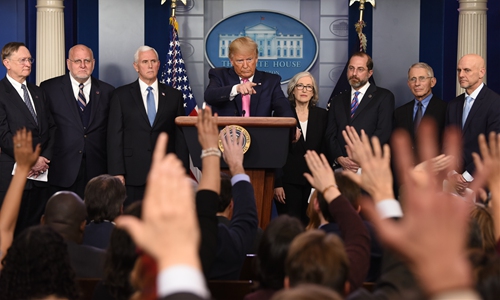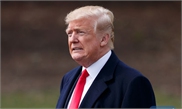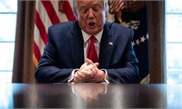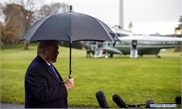
US President Donald Trump (center) on February 26 appoints Vice President Mike Pence to oversee the country's response to the novel coronavirus outbreak. Photos: CNS photo
In an attempt to pull himself out of hot water by announcing he would stop calling novel coronavirus "Chinese virus" on Tuesday, US President Donald Trump probably realized that it is impossible for the US to deal with the pandemic on its own, and that cooperating with China to battle COVID-19 is the best and likely only choice the US has right now - although he is loath to admit it.The decision was announced a day after Trump vowed to "totally protect" the Asian American community who are in no way responsible for the COVID-19 outbreak, and some five days after he first used the racist terms of "Chinese virus."
Trump's change in attitude suggests that his administration had reflected on China's constant message about the virus: It is inaccurate and wrong to use any term that associates the virus with China or Chinese.
Trump about-face shows that while the US is currently in a very bad situation, the worst-case scenario has yet to come. The US is facing a dire shortage of medical materials - face masks, protective outfits, and test kits - and it had to ask South Korea for medical equipment to help combat coronavirus.
While Trump only reluctantly stopped using racist terms to describe the virus, and has yet to formally cooperate with China, he likely has no other option. He is now risking his reelection chances as the epidemic spreads and damages the US economy.
Since cooperation is what the US needs, Washington has had to first change its attitude. The US side might also want to clear the air and communicate with the Chinese side during the special G20 leaders' video summit on Thursday night.
US-China cooperation on COVID-19 is feasible and necessary. China has some capacity to offer a hand, and now Trump has also sent a signal. It is worth noting that if the US asks China for help but once a national emergency is over, Washington very likely returns to its deep-rooted mind-set of strategic and geopolitical competition. China-US joint efforts to contain the virus will not stop the US from confronting and provoking China in other spheres.
The Trump administration is unlikely to show gratitude if China helps it overcome the crisis. Trump's changed attitude is strategic and temporary and won't stop anti-China conservatives in the US from fanning the flames.
The words of Trump as a president matter. The institutions of the US federal government are likely to reduce their hostility toward China to some degree, but this will not open a path for reconciliation between the world's two largest economies. After the pandemic, the US will probably launch fiercer than ever attacks against China. Governments of US states, cities, and counties and many companies are much friendlier to China, in a clear contrast to the federal government.
While China was fighting its hardest against COVID-19, the US said it would provide up to $100 million in assistances to China and other countries impacted by coronavirus, but China did not receive even $1 from the US government. Chinese people are grateful for the help from Americans and US companies.
If needed, China should send its aid directly to places in the US where it is hit hard by the pandemic, rather than give it to the US federal government to distribute.
Bringing COVID-19 under control and protecting people's interests is the US government's most urgent task. To achieve this goal, the Trump administration must keep a sober head and figure out what should come first.
The article was compiled by Global Times reporter Xu Hailin based on an interview with Li Haidong, a professor with Institute of International Relations, China Foreign Affairs University. xuhailin@globaltimes.com.cn



